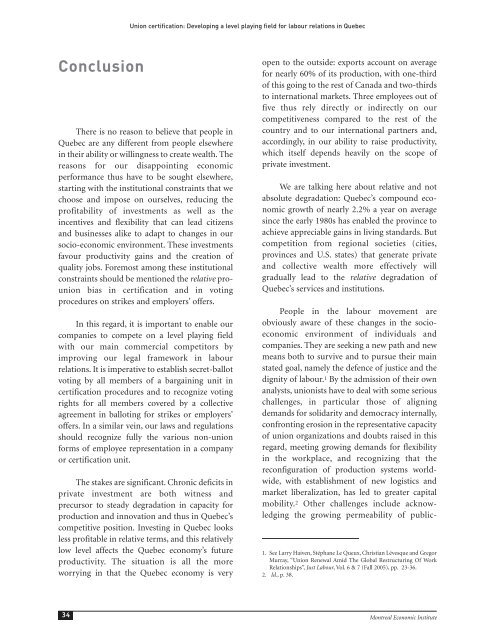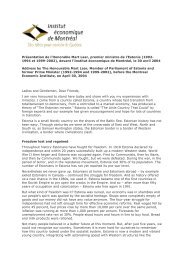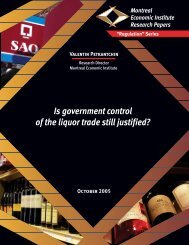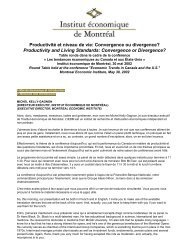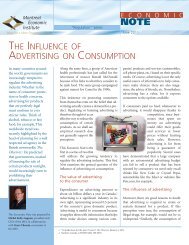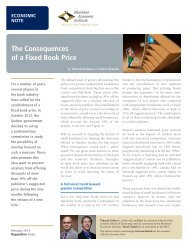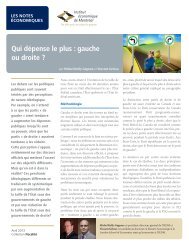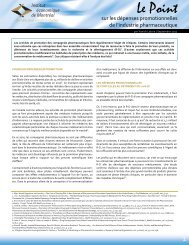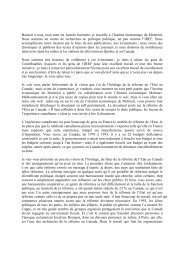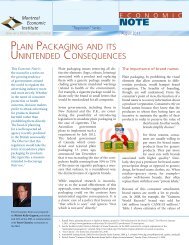Union certification: Developing a level playing field ... - LabourWatch
Union certification: Developing a level playing field ... - LabourWatch
Union certification: Developing a level playing field ... - LabourWatch
You also want an ePaper? Increase the reach of your titles
YUMPU automatically turns print PDFs into web optimized ePapers that Google loves.
<strong>Union</strong> <strong>certification</strong>: <strong>Developing</strong> a <strong>level</strong> <strong>playing</strong> <strong>field</strong> for labour relations in QuebecConclusionThere is no reason to believe that people inQuebec are any different from people elsewherein their ability or willingness to create wealth. Thereasons for our disappointing economicperformance thus have to be sought elsewhere,starting with the institutional constraints that wechoose and impose on ourselves, reducing theprofitability of investments as well as theincentives and flexibility that can lead citizensand businesses alike to adapt to changes in oursocio-economic environment. These investmentsfavour productivity gains and the creation ofquality jobs. Foremost among these institutionalconstraints should be mentioned the relative prounionbias in <strong>certification</strong> and in votingprocedures on strikes and employers’ offers.In this regard, it is important to enable ourcompanies to compete on a <strong>level</strong> <strong>playing</strong> <strong>field</strong>with our main commercial competitors byimproving our legal framework in labourrelations. It is imperative to establish secret-ballotvoting by all members of a bargaining unit in<strong>certification</strong> procedures and to recognize votingrights for all members covered by a collectiveagreement in balloting for strikes or employers’offers. In a similar vein, our laws and regulationsshould recognize fully the various non-unionforms of employee representation in a companyor <strong>certification</strong> unit.The stakes are significant. Chronic deficits inprivate investment are both witness andprecursor to steady degradation in capacity forproduction and innovation and thus in Quebec’scompetitive position. Investing in Quebec looksless profitable in relative terms, and this relativelylow <strong>level</strong> affects the Quebec economy’s futureproductivity. The situation is all the moreworrying in that the Quebec economy is veryopen to the outside: exports account on averagefor nearly 60% of its production, with one-thirdof this going to the rest of Canada and two-thirdsto international markets. Three employees out offive thus rely directly or indirectly on ourcompetitiveness compared to the rest of thecountry and to our international partners and,accordingly, in our ability to raise productivity,which itself depends heavily on the scope ofprivate investment.We are talking here about relative and notabsolute degradation: Quebec’s compound economicgrowth of nearly 2.2% a year on averagesince the early 1980s has enabled the province toachieve appreciable gains in living standards. Butcompetition from regional societies (cities,provinces and U.S. states) that generate privateand collective wealth more effectively willgradually lead to the relative degradation ofQuebec’s services and institutions.People in the labour movement areobviously aware of these changes in the socioeconomicenvironment of individuals andcompanies. They are seeking a new path and newmeans both to survive and to pursue their mainstated goal, namely the defence of justice and thedignity of labour. 1 By the admission of their ownanalysts, unionists have to deal with some seriouschallenges, in particular those of aligningdemands for solidarity and democracy internally,confronting erosion in the representative capacityof union organizations and doubts raised in thisregard, meeting growing demands for flexibilityin the workplace, and recognizing that thereconfiguration of production systems worldwide,with establishment of new logistics andmarket liberalization, has led to greater capitalmobility. 2 Other challenges include acknowledgingthe growing permeability of public-1. See Larry Haiven, Stéphane Le Queux, Christian Lévesque and GregorMurray, “<strong>Union</strong> Renewal Amid The Global Restructuring Of WorkRelationships”, Just Labour, Vol. 6 & 7 (Fall 2005), pp. 23-36.2. Id.,p.38.34 Montreal Economic Institute


